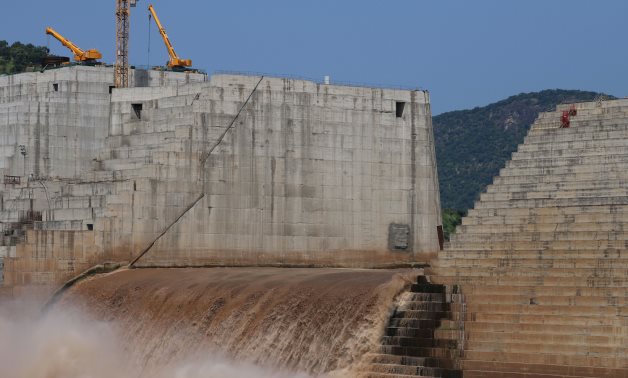
FILE PHOTO: Water flows through Ethiopia's Grand Renaissance Dam as it undergoes construction work on the river Nile in Guba Woreda, Benishangul Gumuz Region, Ethiopia, September 26, 2019. REUTERS/Tiksa Negeri/
CAIRO- 27 November 2020: The controversial Grand Ethiopian Renaissance Dam (GERD) will start the first round of power generation in June 2021, Ethiopian Fana Broadcasting Corporate S.C reported Ethiopian Minister of Water, Irrigation and Energy Seleshi Bekele on Thursday.
“In June 2021, the dam will start its first round of power generation,” he said during an online lecture at the University College London (UCL).
The Ethiopian announcement of generating power comes amid rejection by the other Nile downstream countries [Egypt and Sudan]. Four days ago, Sudanese Prime Minister Abdullah Hamdok stated that the GERD directly affects his country, asserting that it must not be operated until an agreement is reached.
Earlier, Sudan decided not to participate in the tripartite meeting with Egypt and Ethiopia in the coming round of tripartite meetings.
The three countries have conducted several meetings under the brokerage of the African Union (AU) over the last few months, but they reached a stalemate every round they held on the technical and legal points of contention.
Late October, Egyptian Minister of Water Resources and Irrigation Mohamed Abdel-Atti in an interview with “From Cairo” T.V. program on Sky News Arabia said that Ethiopia is responsible for the failure of reaching a comprehensive agreement with the Nile downstream countries [Egypt and Sudan] regarding the operation and the filling of its dam.
The conflict between Egypt, Sudan, and Ethiopia dates back to May 2011 when Ethiopia started building the dam; Egypt voiced concern over its water share [55.5 billion cubic meters]. Three years later, a series of tripartite talks between the two countries along with Sudan began to reach an agreement, while Ethiopia continued the dam construction.
In 2015, the three countries signed the Declaration of Principles, per which the downstream countries should not be negatively affected by the construction of the dam. In October 2019, Egypt blamed Addis Ababa for hindering a final agreement concerning a technical problem, calling for activating Article No. 10 of the Declaration of Principles, which stipulates that if the three countries could not find a solution to these disputes, they have to ask for mediation.
Washington had brokered a tripartite discussion between the three countries, in presence of the President of the World Bank (WB) starting from November 6, 2019 until February 27 and 28, 2020 when Ethiopia apologized for being absent from the negotiations. During these rounds of talks, tangible outcomes were agreed on among the three parties concerning the rules and mechanism of operating the dam and the filling process of the reservoir during the drought and prolonged drought; however, the Ethiopian and Sudanese refused to sign the US/WB-drafted deal.

Comments
Leave a Comment